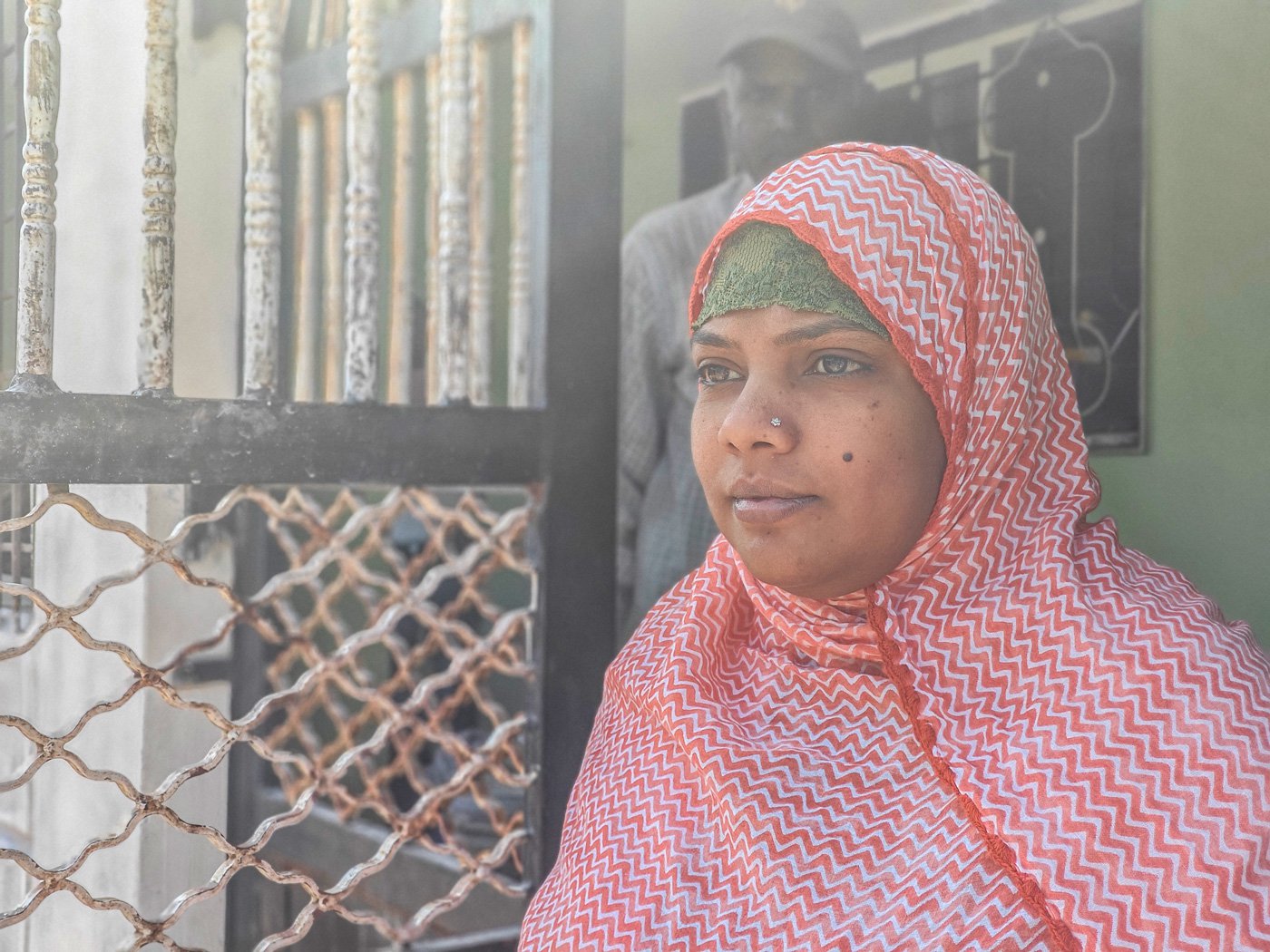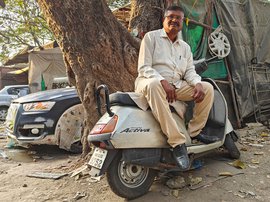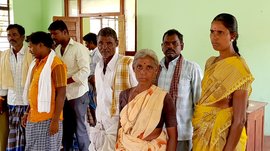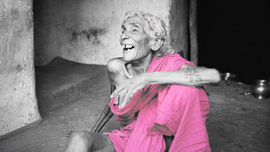He worshipped Virat Kohli. She adored Babar Azam. He would always point out when Kohli scored a century, and she would tease him when Babar performed well. Cricket banter was Ayesha and Nurul Hasan’s love language, to the extent that others around them were often surprised to learn they had an arranged marriage.
When the time table for the cricket World Cup came out in June 2023, Ayesha's eyes lit up. The India versus Pakistan clash was scheduled on October 14 in Ahmedabad, Gujarat. “I told Nurul we must watch it from the stadium,” Ayesha, 30, recalls, sitting in her maternal village of Rajache Kurle in western Maharashtra. “India and Pakistan hardly play bilateral matches. It was a rare opportunity to see both our favourite players together.”
Nurul, 30, a civil engineer, made some calls, and managed to get two tickets, much to the couple’s delight. Ayesha would have been in the sixth month of her pregnancy by then, so they meticulously planned the 750 kilometre journey from their village of Pusesavali in Satara district. The train tickets were booked and accommodation was arranged. The day finally arrived but the couple didn’t make it.
When the sun rose on October 14, 2023, Nurul had been dead for a month, and Ayesha was devastated.
*****
On August 18, 2023, a screenshot went viral in Pusesavali – a village located about 60 kilometres from Satara city in Maharashtra. Adil Bagwan, 25, a Muslim boy from the village, was seen abusing Hindu gods in an Instagram comment. To this day, Adil maintains the screenshot is morphed, and even the friends on his Instagram didn’t see the actual comment.
However, to ensure no unrest of law and order, senior members of the Muslim community in Pusesavali took him to the police, and asked them to investigate the screenshot. “We also said that if Adil is found guilty, he should be punished and we will condemn it,” says Siraj Bagwan, 47, who runs a garage in Pusesavali village. “The police confiscated Adil’s phone and filed a complaint against him for spreading enmity between two religions.”

'We also said that if Adil is found guilty, he should be punished and we will condemn it,' says Siraj Bagwan, 47, who runs a garage in Pusesavali village
Yet, incensed members of Hindu far-right groups in Satara carried out a rally the following day in Pusesavali, calling for mass violence against Muslims. They even threatened to take law and order in their own hands.
Siraj and other senior members of the Muslim community, who were prompt to ask the local police station for a fair investigation into the screenshot, also pleaded for the security of other Muslim residents in Pusesavali who had nothing to do with it. “We told the police that there is a strong possibility of a riot,” Siraj recalls. “We begged for some preventive measures.”
However, Gangaprasad Kendre, the assistant police inspector at Aundh police station, under which Pusesavali falls, ridiculed them, according to Siraj. “He asked us why we followed Prophet Mohammad when he was just an ordinary man,” he recalls. “I couldn’t believe that a man in uniform would say something like this.”
For the next two weeks, members of two radical right wing groups – Hindu Ekta and Shivpratishthan Hindustan – would stop random Muslim men in Pusesavali, and force them to chant ‘Jai Shri Ram’, threatening to burn their homes. The village was on the edge, the unease was palpable.
On September 8, two more similar screenshots went viral in the names of Muzammil Bagwan, 23, and Altamash Bagwan, 23. Both were residents of Pusesavali and were seen abusing Hindu gods under an Instagram post, just like Adil. Like Adil, both the young men maintain the screenshots were photoshopped. The post itself was a collage of slurs by Muslim men against Hindus.
Far-right Hindu groups are alleged to have made the content.
It has been over five months, and the police are still investigating the authenticity of the three screenshots in question.
But the damage it intended to do has been done – the village, already on the edge with communal tensions, spilled over into violence. The attempt by local Muslims in Pusesavali to secure preventive action on September 9, didn’t work.
An enraged mob of over hundred far-right Hindus descended onto the village after sunset on September 10, torching and vandalising Muslim-owned shops, vehicles and homes. According to the estimates of Muslim community members, 29 families were targeted, and they incurred a total loss of Rs. 30 lakh. In a matter of minutes, lifelong savings were reduced to rubble.

Vehicles parked across the mosque on that fateful day in September were burnt. They continue to remain there
Ashfaq Bagwan, 43, who runs an e-SeWa Kendra (a one-stop centre for all court-related needs of the common litigant) in Pusesavali, pulls out his phone and shows this reporter a photograph of a frail, old man, sitting on the floor, with his head covered in blood. “When they stoned my window, the glass shattered and hit my father on the head,” he recalls. “It was a nightmare. The cut was so deep, we couldn’t treat it at home.”
But Ashfaq also couldn’t step out with a hysterical mob on the loose. If he had, Ashfaq might have met the same fate as the young husband and cricket enthusiast, Nurul Hasan.
*****
When Nurul returned home from work that evening, Pusesavali hadn’t begun to burn. Unaware of the mob that set out earlier that day, Nurul decided to freshen up and head to the village mosque to offer his evening prayers. “I told him to do it at home because a few guests had come over,” Ayesha recalls. “But he said he would be back soon, and left.”
An hour later, Nurul called Ayesha from the mosque and told her to not leave the house at any cost. Ayesha, who was petrified for Nurul, heaved a sigh of relief when she learnt he was inside the mosque. “I didn’t expect the mob to attack a place of worship,” she confesses. “I didn’t think it would go that far. I thought he would be safe inside the mosque.”
She was wrong.
After vandalising and torching Muslim-owned properties, the mob swarmed the mosque, which had been locked from inside. Some torched vehicles parked outside, while others tried to break in. With each blow to the door of the mosque, the latch loosened. Eventually, the latch gave up and the doors swung open.
Using sticks, bricks and floor tiles, the frenzied mob brutally assaulted Muslims who were, just moments ago, peacefully offering their evening prayers. One of them picked up a tile and broke it on Nurul’s head, after which he was lynched to death. Eleven more people were seriously injured in the attack. “I couldn’t believe it until I saw his dead body,” Ayesha says.

The mosque in Pusesavali where Nurul Hasan was lynched
“I know the people accused in Nurul’s murder. They used to call him bhai [brother]. I wonder how they didn’t remember that while lynching him to death,” adds the sorrowing wife.
For days, Muslims in Pusesavali had implored the police for preventive action against an assault of this kind. They could see it coming from a mile. The only people that didn’t see it coming were perhaps the Satara police.
*****
The horrific attack on the mosque was five months ago but Pusesavali remains a divided house: Hindus and Muslims have not only stopped mingling and now look at each other with suspicion. People that once dined in each other’s homes, now engage in cold, transactional exchanges. The three Muslim boys from Pusesavali, who were accused of posting derogatory comments against Hindu gods, have left the village fearing for their lives; they now live with relatives or friends.
“In India, you are supposed to be innocent until proven guilty,” says Muzammil Bagwan, 23, who spoke to this reporter on the condition that his location would not be disclosed. “But if you are a Muslim, you are guilty until proven innocent.”
On the night of September 10, Muzammil was on his way back to Pusesavali after attending a family function when he stopped to grab a bite about 30 kilometres away. While waiting for the food to arrive, he opened WhatsApp on his phone to find out that some of the Hindu friends in his contact list had updated their status.
When Muzammil clicked to check the update; he froze, he thought he would throw up. All of them had uploaded the screenshot, which condemned Muzammil and carried his alleged abusive comment. “Why would I invite trouble by posting something like this?” he asks. “It is a photoshopped picture only meant to incite violence.”
Muzammil immediately approached the local police station and surrendered his phone. “I requested them to check it thoroughly,” he adds.
The police have not been able to determine the veracity of the comments as they are waiting for a response from Meta – the company that owns Instagram. The required details have been sent to the company, which needs to look into its server and come back with an answer, according to Satara police.
“It isn’t surprising that Meta has taken that long to respond,” says Osama Manzar, founder of Digital Empowerment Foundation. “It isn’t their priority, and the police aren’t too keen to solve it either. The process becomes the punishment.”
Muzammil says until he is proven innocent, he won’t return to the village. He is currently renting an apartment in western Maharashtra for Rs. 2,500 a month. He meets his parents once every 15 days but there is little conversation. “Whenever we meet, my parents break down in tears,” says Muzammil. “I have to put up a brave face for them.”

'In India, you are supposed to be innocent until proven guilty,' says Muzammil Bagwan, 23, at an undisclosed location. Bagwan, who is from Pusesavali, was accused of abusing Hindu gods under an Instagram post
Muzammil has taken up a job at a grocery store where he earns a salary of Rs. 8,000 to cover his rent and expenses. In Pusesavali, though, he ran his own successful ice-cream parlour. “It was a rental shop,” Muzammil says. “The owner was Hindu. He kicked me out after the incident, and said I would only get it back after I am proven innocent. So my parents are now selling vegetables to make ends meet. But the Hindus in the village refuse to buy from them.”
Even little kids have not remained immune from the polarisation.
One evening, Ashfaq Bagwan’s nine-year old son, Uzer, came home dejected from school because the other kids wouldn’t play with him. “The Hindu kids in his class refused to include him because he is a ‘ landya ’, a derogatory term used against Muslim people which refers to circumcision," says Ashfaq. “I don’t blame the kids. They repeat what they hear at home. Sadly, this was never the atmosphere in our village.”
Every three years, Pusesavali hosts a Parayana session, where Hindus recite and chant scriptures across eight days. The latest session transpired on August 8 – a month before the violence erupted in the village – when the local Muslims had sponsored the first meal on the first day of the event. A 150 litres of sheer kurma (vermicelli sweet dish) was prepared for 1,200 Hindus.
“We spent Rs. 80,000 on that meal,” Siraj says. “The whole community chipped in because that is our culture. But if I had used that money to install an iron gate for the mosque, one of our people would have been alive today.”
*****
According to Mr. Devkar, Police Inspector investigating the case, 63 people have been arrested and chargesheeted for the violence on September 10, 34 are absconding and 59 have already received bail.
“Rahul Kadam and Nitin Veer are the main accused in this case,” he said. “They both work with Hindu Ekta.”
The top leader of Hindu Ekta, a far-right organisation active in western Maharashtra, is Vikram Pawaskar, who is also the vice president of Maharashtra state BJP. He has photos on his social media with Prime Minister Narendra Modi, and he is said to be close to former Chief Minister of Maharashtra, Devendra Fadnavis.
Son of Vinayak Pawaskar, a senior Hindutva leader, Vikram has a history of delivering hate speeches and inciting communal tensions. In April 2023, he led an agitation to demolish an “illegally constructed mosque” in Satara.

Saffron flags in the village
In June 2023, at a rally in Islampur, Pawaskar called for “Hindus to unite” to fight against ‘love jihad’, an unproven conspiracy theory of the Hindu right, which claims that Muslim men seduce Hindu women so they can convert to Islam after marriage, ensuring demographic growth and eventual domination in India. “Our daughters, our sisters are abducted and hunted for ‘love-jihad’,” he said. “Jihadists are trying to destroy women and wealth in Hinduism. We should all give them a comprehensive answer.” He further endorsed the economic boycott of Muslims while calling for India to become a Hindu country.
According to an eyewitness of the violence, Pawaskar had held a meeting at the residence of one of the accused days before the assault in Pusesavali. Over a hundred unknown people were part of the Hindutva mob that attacked the village. But 27 of them were from the village and some of them were present at the meeting Pawaskar held, he told the police. When the mob barged into the mosque in the village, one of them said, “No landya should be left alive tonight. Vikram Pawaskar has our back. Don't show mercy.”
Yet, the police have not arrested him. Satara’s Superintendent of Police, Sameer Shaikh, refused to engage with this reporter on this particular story. “The necessary details are in public domain,” he said, and avoided answering further questions about the investigation or the role of Pawaskar.
In the last week of January 2024, The Bombay High Court even chastised the Satara police for not taking any action against Pawaskar.
*****
The Satara police’s tepid response makes Ayesha wonder if she would ever get justice, if Nurul’s murderers would ever be punished, and if the mastermind will ever be brought to book. A lawyer herself, the grieving wife smells a cover up.
“Most of the accused are already out on bail, roaming around freely in the village,” she says. “It feels like a cruel joke.”
She has decided to spend more time with her parents in Rajache Kurle instead of Pusesavali, where she feels insecure and misses her husband even more. “It is just four kilometres away so I can shuttle between the two villages,” says Ayesha. “But right now, my priority is to get my life back on track.”

Ayesha Hasan, Nurul's wife, in Rajache Kurle village at her parents’ home
She considered restarting her law practice but has decided against it for the time being because it isn’t a promising career in the village. “It would be different if I moved to Satara city or Pune,” Ayesha says. “But I don’t want to be away from my parents. They have health issues, and I need to be there for them.”
Ayesha’s mother, Shama, 50, has high blood sugar, and father Hanif, 70, had a heart attack in December 2023, triggered by the stress of his daughter’s situation. “I don’t have any siblings,” Ayesha says. “But Nurul had filled the void of a son, he often felt. Ever since he died, my father has not been himself.”
Even though Ayesha has opted to stay with her parents and look after them, she has more to do. Something that will give her life meaning and purpose: she wants to fulfil her late husband’s wishes.
Just five months before the incident, Nurul and Ayesha had formed their own construction company – Ashnoor Private Limited. He was supposed to bring in work, and her job was to look after the legalities.
Now that he’s gone, she doesn’t want to shut it down. “I don’t know much about construction,” she says. “but I will learn and take the company forward. I am struggling financially right now but I will raise funds and make it work.”
The second wish is a little less complicated.
Nurul was eager for his kid to learn cricket. Not from any sports academy, but the one where Virat Kohli trained. Ayesha's on the job to make Nurul's dream a reality. "I’ll do it,” she says firmly.




